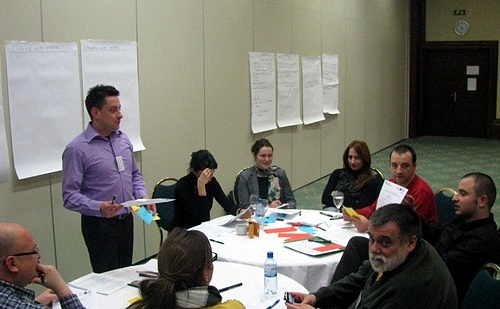| Besides humanitarian, other types of support are also necessary |
 |
 |
 |
| Wednesday, 02 March 2011 13:16 | |||
|
Twenty-five representatives from civil society organizations from Albania, Bosnia and Herzegovina, Croatia, Kosovo, Macedonia, Montenegro and Serbia gathered together on February 28 and March 1, 2011 in Skopje to discuss the challenges of the civil society organizations as well as the need for creating enabling environment during conflict situations and in the post conflict period.
The Thematic Consultation “CSOs working in situations of conflict” was held within the Open Forum on CSO Development Effectiveness, organized by MCIC, BCSDN, Civicus and Open Forum The conflicts change the focus of activities of the existing civil society organizations, simultaneously encouraging the establishment of new civic associations. The principles of respect for human rights, transparency and accountability as well as working with others are hard to be observed in situations of conflict. The partnership and cooperation between the civil society organizations are even more important during conflicts, but also afterwards during the process of peace and trust building. Civil society organizations had series of successful and useful activities during and after the conflicts in the former Yugoslav republics aimed towards providing immediate assistance to the people affected by the conflicts and empowering them for restoring their life after the conflicts. However, the greatest challenge during and after the conflicts was earning the trust from the people and providing ownership of the priorities in the societies. Not less important challenge was the safety and security of the beneficiaries, activists and staff of the civil society organizations during the conflict.
The governments, donors and international organizations should start monitoring the respect of the human rights, particularly of the newly established minorities, immediately as soon as the conflicts begin. Besides the humanitarian assistance, the donors should continue the support for the regular activities of the civil society organizations in conflict situations and afterwards. Frequently, these activities of the civil society organizations contribute for resolving the conflict and reconciliation. It is also necessary to strengthen the capacities of the local communities in order to be able to live in the post conflict period. The coordination among the donors is vital during the conflicts, as well as the cooperation among them, the civil society organizations and the government in order to provide effective assistance. The civil society organizations may and should be involved by the governments in the process of resolving the conflict and in the strategy and policy making. The freedom of expression, association and peaceful gathering should not be prevented.
|
Google translate
Latest
- Граѓанските организации дискутираа за како подобро да ги промовираат своите постигнувања
- Справување со корупцијата - земјите од Западен Балкан на патот кон ЕУ
- Перцепцијата за корупција останува висока: судиите и обвинителството на врвот
- Граѓански импулс #13 – месечен осврт на активностите на грантистите
- Граѓанското учество е право и одговорност на сите










